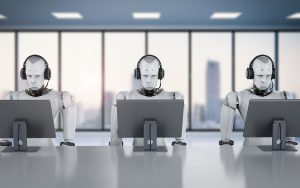Maryanne Emomeri and Ruth Atim
Artificial intelligence (AI) is set to have a significant impact on the future of work. While AI has already been automating many routine and repetitive tasks, it is increasingly being used to augment human intelligence and decision-making capabilities. It has had many impacts on the future of worklike automating many routine and repetitive tasks, freeing up human workers to focus on more complex and creative tasks that require human ingenuity.
AI also provides decision support by analyzing large amounts of data and providing insights that can help humans make better decisions. It can also increase productivity by automating tasks, reducing errors, and providing decision support. On a good note, AI will be left to deal with automating routine tasks, and we will become more focused on creativity, problem-solving, and interpersonal skills.
While AI has the potential to revolutionize work, it is important to ensure that the benefits of AI are shared fairly and that workers are supported through the transition. But it may also be a threat in some instances, for example; AI doesn’t possess qualities such as human connections, empathy, critical thinking, creativity and social intelligence. Teachers, doctors, psychologists and cybersecurity professionals among others are some of the people who will survive the AI revolution.
As machines become increasingly smart and effective at carrying out tasks, what are some of the changes to anticipate? Let’s explore some of the ways that AI is changing or will change the work culture.
- Efficiency and Productivity:Apparently, what man can do, AI can do better. Unlike human beings, AI won’t experience burnout or emotional ups and downs. This is what makes AI convenient as it won’t go through fatigue, get bored doing repetitive tasks and it works for longer hours and won’t ask for a salary increase. AI is even more productive and effective since it’s free from human error.
- Decision Making: Have you ever wondered how Netflix is able to make near perfect personalizedmovie suggestions for you? AI significantly contributes to making this possible by analyzing your previous preferences. AI can also assist in the hiring process by reviewing CVs and cover letters and selecting the best candidates thus influencing the hiring decisions.
- Task Automation: Tasks such as data entry, customer service, report and CV generation are performed faster and at a lower cost using AI. Nowadays, it’s commonplace to interact with a chatbot on websites than accessing help through contact forms, emails or making calls. In sectors such as the construction industry, AI will lower the risk of accidents and injuries. Generative AI tools like Dall- E 2 and Gen 1 will also simplify work.
- Fraud Detection: In the financial and online security industry, AI’s ability to analyze large amounts of data at the same time and detect unusual activities in real time, more fraudulent activities will be detected early and averted.
- New Professional Roles: AI will create room for new job roles such as AI developers, AI hardware specialists, artificial intelligence and machine learning engineers, ethical AI specialists and robotoperators.
The Drawbacks.
Elon Musk and some AI researchers recently issued an open letter urging a pause on giant AI experiments stating that AI systems with human-competitive intelligence can pose greater risks to society and humanity. True to their words, AI comes with its own set of drawbacks, that include;
- More Cyberthreats: AI tools have the ability to write malicious codes that can be used to launch attacks on systems and undermine security. Having in mind that AI has the ability to automate tasks and identify vulnerabilities, it can also launch more serious attacks.
- Job Loss: As mentioned earlier, artificial intelligence will declare many jobs obsolete. Self-driving cars will do away with chauffeurs, chatbots will get rid of customer service representatives and so on. People will be compelled to take up more courses that will shift careers.
- Over dependence on AI: Although AI appears to be superior to humans, it cannot replace human ingenuity or invention. But, if humans rely too much on AI, they will be constrained in their capacity for creativity and problem-solving, which could lead to a future in which human beings think like robots.
- Cultural Bias: Lack of diversity will result in prejudice of any kind, whether it be cultural or otherwise while designing AI systems. AI programmers will be people, and people make assumptions. Since different individuals hold different views and because laws and policies may not be implemented quickly enough to keep up with developing technologies, cultural prejudice may manifest itself in a variety of ways.
In a nutshell, the impact of AI on the future of work is dependent on how it is implemented and the extent to which it is integrated with human work.
(An illustrated internet Image showing how the future looks like, and why we all need to diversify to remain relevant).
